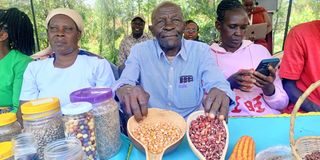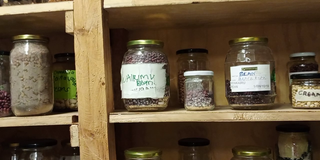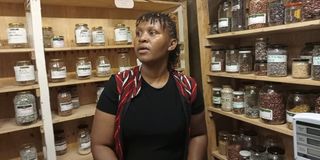Inside unique trade in Kampi ya Moto where farmers use seeds as currency

Joseph Stephen Mwangi, a farmer from Kampi ya Moto,Rongai displays indigenous seeds from their seed bank on August 12,2025.
Across Nakuru County, farmers are proving that you don’t always need money to survive.
In villages like Kampi ya Moto near Kabarak, seeds themselves have become a form of currency.
Community seed banks allow farmers to borrow, save, and repay seeds, ensuring that no one goes without planting material when the rains fall.
The idea is simple but powerful. If a farmer borrows half a kilogram of planting seeds, they return one kilogram after harvest.
That “interest” keeps the banks stocked and encourages multiplication of indigenous varieties.

Seeds on display at the Seed Savers network gene Bank on August 12,2025
Unlike commercial seed shops, which often sell only hybrid seeds, these banks preserve a treasure of local crops like colorful maize, sorghum, yams, pigeon peas, sweet potatoes, and indigenous vegetables like managu (Black Nightshade) and terere (Pig Weed).
For many farmers, this system has restored both food security and dignity. Joseph Stephen Mwangi, a farmer from Kampi ya Moto, Rongai explains how it works in his village.
“Our group has a seed bank where we store the healthy seeds after harvest. During planting season we remove them, share amongst ourselves and replant. That way the seed variety never disappears. If we don’t have a certain seed, we exchange with others from nearby communities, mostly those in Baringo because we share almost the same weather. We have been doing this since 2011, and it keeps us going,” he explains.
Mwangi is proud that the seed banks free farmers from reliance on expensive agro-shops.
“The government wants us to buy from companies, but we don’t always have the money. With the seed bank, if someone doesn’t have seed, we share. No one is left out,” he remarks.
Head of Programs at the Seed Savers Network, Julia Kamau, calls this model both cultural and revolutionary.

Julia Kamau, Head of programs at Seed savers network explains how seed banks can be used to ensure seed and food sovereignty on August 12,2025.
“Seed banks work just like financial banks. But here, the currency is seed. You borrow, you return with interest, and sometimes farmers even come back with new varieties. It’s an Ubuntu system, built on generosity and trust,” she says.
Julia notes that the COVID-19 pandemic showed just how valuable these community networks are.
As people grew more health-conscious and the demand for indigenous foods soared, farmers in the Seed Savers Network supplied sweet potato vines, yam tubers, and leafy greens that had nearly disappeared from markets.
For many, seed saving became not just a way to survive, but an economic opportunity.
"In situations where there is no seed in the market, farmers with large quantities of seed can opt to sell their variety other than just exchanging, providing them with a secondary source of income other than farming," she says.
She however maintains there are challenges.
"Farmers say government support is needed to recognize indigenous seeds, strengthen community banks, and improve market access. More to it is the motivation so that the farmers do not give up on the course. This can be by helping them set up more seed banks and financial support for those who want to scale up," she notes
Echoing her sentiments, Mwangi says, "It is our dream that one day we can package indigenous seeds and sell them to different areas with the same climatic conditions as ours. This way the preservation of this seed in our country will complement the seed banks, when the seed is available in more homes."
Mwangi concludes by saying, in Kampi ya Moto and other towns preserving seeds through seed banks and seed sharing, wealth doesn’t sit in banks or vaults.
It multiplies in the soil, blossoms in the fields, and fills homes with diverse, nourishing food, proving that in the right hands, seeds are more valuable than shillings.


